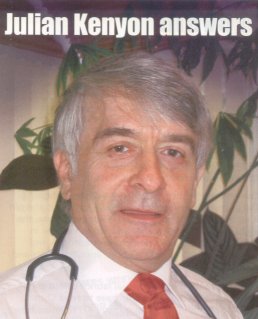Originally published in September-October 2004 icon

Dr Kenyon can also be reached directly, via www.doveclinic.com
Telephone: 020 7486 5588 or 01962 718 000
September & October 2004
Q:
I spent two years going backwards and forwards to doctors because I was in a lot of pain but was told they could find nothing wrong. Eventually they found I have a tumour wrapped around my aorta. It is a paraganglioma and has now spread to my lungs. The surgeon said it was too dangerous to remove it. Because it is a rare cancer, the oncologist was unsure how to treat it. I’m currently taking Imatinib but after five weeks have had to stop because my immune system is too low.Staten Island University Hospital in New York has led the way with refined development of non-invasive techniques for Fractionated Stereotactic Radiosurgery treating benign and malignant tumours. Have you done any research on this type of treatment?
Another treatment I’ve recently heard about is photodynamic therapy used together with a drug called Radachlorin. I believe this drug and treatment is from Radapharma in Russia. Is this something you have researched?
A:
You indeed have a rare tumour. I have in fact seen two of these cases. In the past I’ve had some success in treating these conditions with angiogenesis inhibitors, as they are rich in blood vessels and this is what makes surgery too dangerous.
I’m aware of the Staten Island Fractionated Stereotactic Radiosurgery Facility, but in fact they’ve published no data on their work so I’m most unsure about them.
You ask about photodynamic therapy and Radachlorin: I’m well acquainted with this photodynamic substance which is much more powerful than other existing photodynamic preparations. It is not currently available in this country but there are moves afoot to bring it in on a "special needs" basis.
The problem from your point of view is if the tumour is invading blood vessels then there may be bleeding which occurs due to tumour cell destruction, which may be dangerous. In the past we’ve tried high dose intravenous vitamin C on our cases with paraganglioma and have had some encouraging results.
I hope you find this helpful, but it isn’t an easy situation for you.
Q:
I am 43 years old and married with three children. I lost two sisters to cancer. One died of breast cancer at 38 and the other of ovarian cancer at 55. The second one had a check and found she was carrying the gene. My mother’s sister died from ovarian cancer at 60.
My gynaecologist in Israel recommends taking out my ovaries - what is your opinion?
Also do you think a pregnancy at my age can trigger this disease?
A:
You have a strong history of ovarian and breast cancer. A "belt and braces" approach has been suggested by your doctor. Removing the ovaries clearly would stop you getting ovarian cancer; however there are other ways of handling this potential problem.
Firstly, having as healthy a lifestyle as possible, organic food and a reasonably stress free life would be helpful.
Most importantly, improving your cell mediated immunity is a major goal because in prospective studies, people with good cell mediated immunity have approximately 50% less cancer incidence than those with poor immunity. There’s a whole range of ways of stimulating cell mediated immune function but you need somebody who can expertly measure these factors with appropriate biochemistry for your particular case. At our clinic we measure Interferon Gamma at a gene expression level and monitor immune supported treatment based on that. There is no evidence to suggest that getting pregnant will increase your chances of contracting ovarian cancer.
Ed: Icon has carried numerous articles on the ways of keeping your immune system high and your toxin levels low
Q:
I recently sent letters to seven major hospitals in the UK re the use of Cimetidine for colon cancer - so far with no reply. It has fantastic results in small scale trials and the probability figures show it is 99% certain to give similar results in large scale trials, which of course will never be done.
Do you have any ideas about how to get this stuff used?
It has been described to me as "amazing" stuff by the US doctor R A Smith who has been using it for over 20 years. It is also good for various other cancers.
A:
You point out the interesting fact that Cimetidine given pre-surgery in colorectal cancer produces much less metastases post operatively.
The mechanism is that the adhesion of cancer cells to the endothelium is inhibited. (The endothelium is the lining of blood vessels.) At the time of the operation and just after are when most metastases occur.
There are other even simpler approaches which also stop adhesion of cells post operatively, involving the use of sulphur compounds, blocking particular sulphur containing groups on the cell membranes of cancer cells. That is even cheaper and probably as effective as Cimetidine but has not been researched as much.
You made the comment that there has been no interest whatsoever when you wrote to seven major hospitals in the UK. That is indeed disappointing. I believe you have introduced a most interesting point and I use this approach from time to time.